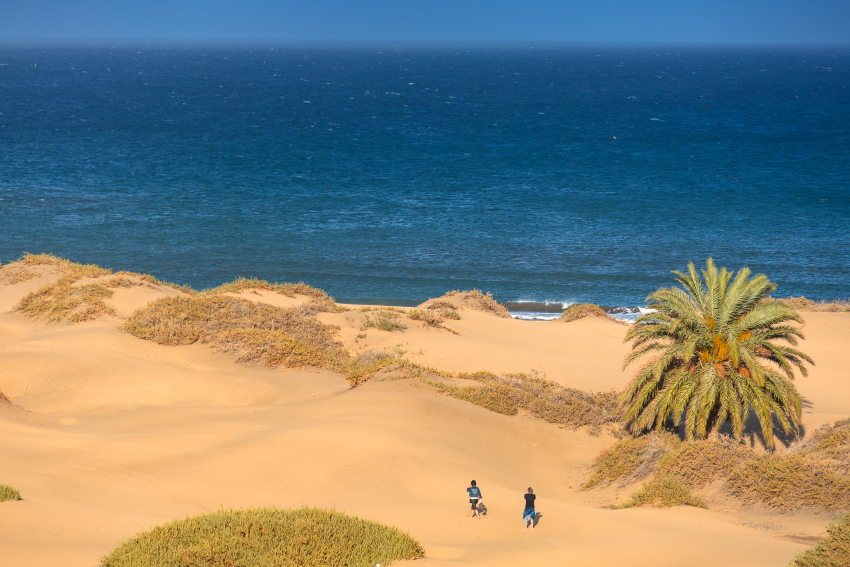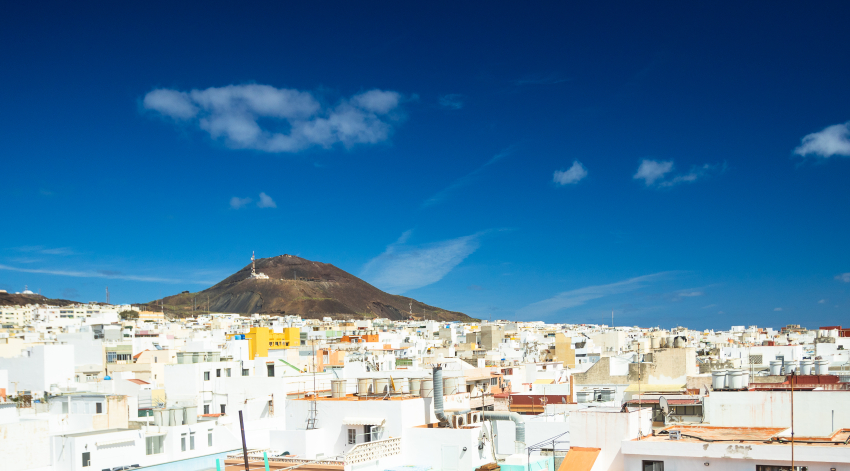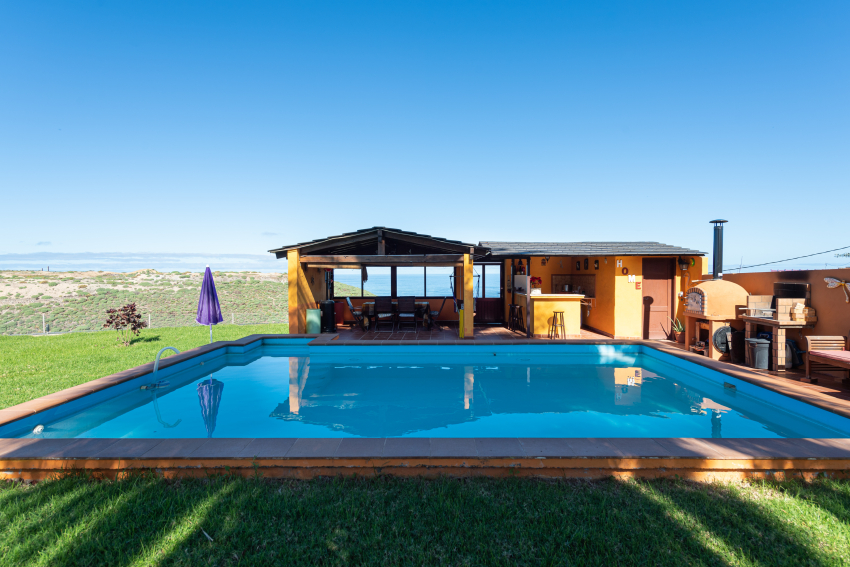Living In Gran Canaria: Opening A Bank Account
Getting a bank account in Gran Canaria is a doddle if you have an NIE or residencia. Just pick a bank and give them your NIE number, passport and a proof of address (utility bill, rent contract).
Then sign a lot of bits of paper and you have an account.
In theory, you can open a non-resident bank account with a passport. You may have to try several banks as some won’t do it without a NIE certificate. Commissions are high, so swap over to a resident’s account as soon as you can.
Which Gran Canaria bank to choose?
There isn’t much between them, but bear these factors in mind.
Smaller banks have few cashpoints and charges for withdrawing money can be eye-watering.
Some banks, such as Santander, don’t charge monthly commissions if you pay in your salary or pension.
Queues in bank branches get long, so pick a bank with a decent online banking system.
Here’s a selection of the main banks in Gran Canaria
La Caixa
La Caixa took over Bankia and now has more offices and cashpoints than any other Gran Canaria bank. Big branches have English-speaking staff and there is English speaking telephone support and English internet banking.
Santander Central Hispano
The same company as Santander in the UK, but you can’t transfer an account or anything convenient like that. Santander has plenty of Gran Canaria branches, a decent network of ATMs, and offers commission-free banking if you have a salary.
Santander has plenty of Gran Canaria branches, a decent network of ATMs, and offers commission-free banking if you have a salary. It even pays interest on your current account balance.
ING Direct
Dutch bank with a couple of Las Palmas branches. ING has an excellent online bank system and even decent queue management in its branches. A good mortgage option.
EVO Banco
A specialist online bank with a handy branch on Mesa y Lopez.
Bank Inter
A bank that does offer good mortgage terms to non-resident buyers
BBVA
Like Santander, but blue instead of red.
Barclays
The same company as Barclays in the UK, but you wouldn’t know it. If you have a UK Barclays account there is no advantage opening a Spanish Barclays account.
Share this:
Living In Gran Canaria: Renting Out Your Property
If you own a Gran Canaria property and want to rent it out, there are three ways to do it and each has its own advantages.
Short-term tourist rental in Gran Canaria
This is perfectly legal if your property is on land classified as residential (everywhere except the tourist resorts). In resort areas, it is more complicated as you have to have a tourist license, rent it out via a central management company, or apply for a license via an association such as ASCAV. Las Palmas has made noises about tightening restrictions on holiday lets and it is not allowed in many new builds.
You do not need the permission of the Comunidad to rent out a private apartment although a Comunidad can vote to ban all touristic rentals in a building or complex (with a majority vote).
You need to apply for a licence via the Gran Canaria tourist board (El Patronato de Turismo: Headquarters on Calle Mayor de Triana in Las Palmas).
Rates vary depending on location and property specifications. Cleaning costs are often added as a one-off extra charge for tenants. If you need a management company to handle bookings, keys, cleaning, etc, expect to pay at least 20% of the rent.
NOTE: Please speak to a quality estate agent before buying a rental investment property in Gran Canaria’s resorts. The law for resort properties is currently in flux and you need expert advice.
Long-term residential rentals in Gran Canaria
Renting out property in Gran Canaria is fairly easy. You can either do it privately by advertising in the local papers or on websites like Segundamano and FotoCasa, or by advertising it via an estate agent. Agencies traditionally charge the tenant one month’s rent, but some are now asking the property owner to pay this fee, or to split it with their new tenant.
Most owners ask for a month’s rent as a deposit and return it once the tenant has left, minus any costs for repairs (reasonable wear and tear cannot by law be deducted from the deposit).
One advantage of renting via an agent is that they handle the contract, but you can download example contracts.
If you are a non-resident, some agencies will manage your property (they arrange for plumbers if there’s a problem, etc) for a monthly fee of around €50.
Renting out Gran Canaria property the middle way
Many owners take a middle road between touristic rentals and residential lets by renting their property to people who spend several months a year living in Gran Canaria. They are often retired Brits and Scandinavians escaping the winter back home (known as snowbirds) but digital nomads are also flocking to Gran Canaria.
The benefits of renting to snowbirds are that you can charge more per month than for a residential let and don’t have to handle frequent keys and cleaning.
To advertise your property to snowbirds, post it on websites like AirBnB and specify a long minimum stay, or post on residential rental portals.
Renting and taxes
Non-resident property owners pay 24% income tax on rental income of all types while residents have to pay income tax. Residents pay income tax.
Most non-residents use a local Gestoria to handle their tax and paperwork.
Living In Gran Canaria: Importing A Car
When you see the prices of second hand cars in Gran Canaria you will probably think about importing a much cheaper car from mainland Europe or the UK. Whilst overall it can be cheaper importing a car there are many costs involved in importing a car to the Canary Islands and you need to consider them carefully before bringing your car here.
The first thing you need to know is that when importing goods into the Canary Islands the Canary Islands are not considered part of Spain, therefore any advice taken from Spanish companies will not be applicable to Gran Canaria, this is particularly important for importation tax. In Spain for some goods you are not liable to pay import tax, for the Canary Islands you are.
Important points on importing cars to Gran Canaria from the EU
If you have owned the vehicle for less than six months you will be taxed heavily.
If you have had a Spanish ID number (NIE) for more than 6 months, again you are liable to be taxed the import duty. This is 9-13% of the value of the car in Spain.
However, if you have owned the car for some time and you are a new resident in the Canaries you are allowed a one-off importation of your goods and import tax is not payable. You will need to obtain a document from your local authority in your origin country before you leave to demonstrate that you have been living there. This, along with local documents will prove your exemption from import tax.
There are additional charges once you arrive, these include matriculation and putting the car through the ITV. These can be up to 200€.
If you are confused have a look at the Agencia Tributaria website for the latest information however this can be often be even more confusing so if in doubt get in contact with a shipping agent such as Migrate Global Canarias.
Once you bring a car to the Canary Islands you are allowed to drive it here for up to 6 months before putting it on Spanish plates, if you don’t re-register it here in the Canary Islands within 6 months you are liable to pay extra charges. However if you take it out within 6 months you don’t have to pay anything.
You may have noted that used cars in the Canaries are not always good value for money. However, you should bear the above points in mind when deciding whether to ship your vehicle to Gran Canaria.
Driving your car into Gran Canaria
One alternative is to pack up your car, drive down to Cadiz or Huelva and use the ferry service. This can be an economical way of shipping a car and all your belongings to Gran Canaria, although it is not without cost and the sailing is 24 hours so it's quite a journey. Many people enjoy the adventure though, and if you already have Canarian residency documents you are entitled to a 75% discount on the ferry cost.
Shipping your car to Gran Canaria
Shipping vehicles to Gran Canaria, without actually driving them, is also common practice. From some parts of Europe and mainland Spain there is a roll-on, roll-off service, whereby you put your vehicle on the ferry at one end and collect it at the other end. Currently the only option available directly from the UK or Ireland is containerized shipping, which can be costly, but which is very safe and also offers you the option of moving personal/ household goods in the same container. The usual procedure is for you to deliver the vehicle to a nominated warehouse near your UK or Ireland address, where it will be loaded on a container, secured for sea transit and shipped here for you. If you are combining this with a household removal, that side of it would be carried out as normal, with a packing service if necessary, a collection, followed by loading together with the car at the warehouse.
Customs Clearance
All unaccompanied goods travelling between the Canaries and the rest of the world, including Europe and mainland Spain, have to clear customs. This is usually a paper-based procedure, although some containers are opened and inspected, but the important thing to know from the outset is the documents you will be asked for, which are NIE and certificado de empadronamiento (see ‘Paperwork’). If you have used a door-to-door removals or transport service you will simply be required to provide these documents and customs clearance will be carried out on your behalf. Otherwise you will need to appoint a customs agent to represent you and you will have to sign some further documents and provide an inventory of contents.
Living In Gran Canaria: Guide To Buying A Property
Buying property in Gran Canaria is a relatively straightforward process if done correctly. The island property registry is excellent, property rights in Gran Canaria are clear, and all contracts must be signed in front of an independent notary.
However, there are pitfalls and we advise all buyers to use a quality estate agent and / or a local lawyer to check their chosen property and contracts.
Laura Says: Estate agent services are free for property buyers as the commission is paid by the seller. Take advantage and find a good one to help you buy your Gran Canaria property
Estate agents in Gran Canaria
Estate agents in Gran Canaria vary from the average to the excellent with a couple of outlying dodgy outfits (targeting non-resident buyers in the resorts). Check reviews carefully before choosing an agent.
Estate agency fees are 5% of the sale price of a property but are paid by the seller. This means that their services are free to buyers; All non-native Spanish speakers should use one when buying property in Gran Canaria.
The risks of going it alone are just too high to bother with as disputes takes a long time and oodles of cash to resolve.
To find a good estate agent in Gran Canaria, look for the following…
- An estate agency with an office you can visit and a good local reputation
- An agency that works within the local agency ssystem and shares commissions with other agents
- An agent that speaks your language and good Spanish
- Above all, choose an estate agent that cares about you, rather than about selling you a particular property
The benefit using a good estate agency include their ability to value a property accurately (many sellers list their property at the price they’d like to get rather than what it is currently worth), the help they provide with paperwork, and good relationships with reliable local banks.
In Las Palmas and the north of Gran Canaria, the Las Palmas Property website is packed with useful information.
In south Gran Canaria, just go to Cardenas Real Estate; One of Gran Canaria’s oldest and most trusted agencies. The Cárdenas blog is an excellent source of quality local information.
Laura Says: Do not buy a rental investment property in south Gran Canaria without getting expert advice from a good estate agent or lawyer. Holiday let rules are complex.
The cost of buying property in Gran Canaria
The total cost of buying a property in Gran Canaria is roughly 10% on top of the price you pay.
This sum includes:
- Fixed property purchase tax (the exact percentage varies depending on property type and Municipality)
- Notary costs (a fixed percentage of the value of the property)roperty registry costs.
- Property registry costs.
The 10% figure is approximate. It can be up to 12% if you buy a cheapie under €100,000 and lower if you buy something substantial.
Laura Says: Seek expert advice if a seller wants you to pay a percentage of the purchase price in cash under the table. This is illegal and has tax implications as the government knows what property is worth and asks for extra taxes on properties that are bought too cheap. You could end up with a huge tax bill up to four years after you buy a property.
Ongoing costs include:
- Monthly Communidad fees (if you buy in a building or complex)
- A small annual tax on the value of the land your property sits on (known as the IBI)
- Utility bills
- There are no council tax bills in Gran Canaria but some municipios, such as Mogán, charge for rubbish collection
What you need to buy a property in Gran Canaria
All buyers must have:
A Spanish NIE number; This fiscal identification number, which you will soon learn by heart, is the same number that goes on your green Residencia paper. Getting a NIE is a faff unless you have a job contract or a pre-contract to buy a property (or are a non-EU citizen investing 500,000 euros in Spanish property; Hello Golden Visa).
A local bank account; Opening a non-resident bank account can be a faf. It's best to wait until you have your NIE and then you'll have no problem.
British and other non-EU/ EEA buyers may need a military authorisation if buying a rural property. This is a formality but can take time so start the application early.
Getting a mortgage in Gran Canaria
Spanish banks learned their lesson rather too well during the crisis and are now cautious about lending money to home buyers. Residents need between 10% and 20% of the sale price as a deposit and a work contract to even be considered (or a long track record of earnings as an Autonomo or self-employed person).
New arrivals often have to wait a year to get a mortgage, even with a permanent work contract. This might seem infuriating, but it’s no bad thing if you consider the number of people who go home after a year in Gran Canaria; not everyone can handle the sunshine and the rum.
Spanish banks currently won’t lend you more than you can pay back with a third of your total income.
Non-residents need a larger deposit (typically 30%) and proof of earnings in their home country going back six months. Spanish banks are unwilling to lend to older non-residents who are due to retire before their mortgage term is up.
Mortgage applications are long-winded (up to three months at some banks) and hampered by top-down management at Spanish banks. Your application is submitted in Gran Canaria but goes to headquarters (always in Madrid) for approval. Any missing documents cause delays that nobody is accountable for. Be vigilant and don’t be afraid to push as silence is often a sign that something needs to be done.
The best advice we can give you is to apply to several different banks; They all require the same paperwork so all you have to do is spend a few hours at each one and feed them with photocopies.
Apply to at least one big local bank such as Santander, BBVA or Bankia, a modern bank such as ING Direct, and a specialist mortgage provider such as UCI (which works exclusively with estate agency clients).
Article written with information from Laura Leyshon of Las Palmas Property.
Living In Gran Canaria: Getting A Teaching Job
Teaching English has always been one of the main ways foreign residents have lived and paid their way in Gran Canaria. While things are getting hard for unqualified teachers, there are always jobs around.
Living In Gran Canaria: Buying A Car
Buying a second hand car in Gran Canaria is a fairly simple process provided you know some Spanish and a bit about cars. If not, get some help.
Living In Gran Canaria: Total Shopping Guide
With one of Spain’s top outdoor shopping areas and several well-stocked malls, Gran Canaria (and especially Las Palmas), has become a great place to shop. The new shopping centres due to open in Puerto Rico will make a big difference in south Gran Canaria.
Gran Canaria Info recommends:
- Default
- Title
- Date
- Random















